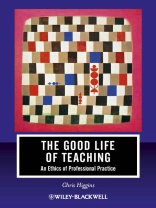The Good Life of Teaching extends the recent revival of
virtue ethics to professional ethics and the philosophy of
teaching. It connects long-standing philosophical questions about
work and human growth to questions about teacher motivation,
identity, and development.
* Makes a significant contribution to the philosophy of teaching
and also offers new insights into virtue theory and professional
ethics
* Offers fresh and detailed readings of major figures in ethics,
including Alasdair Mac Intyre, Charles Taylor, and Bernard Williams
and the practical philosophies of Hannah Arendt, John Dewey and
Hans-Georg Gadamer
* Provides illustrations to assist the reader in visualizing
major points, and integrates sources such as film, literature, and
teaching memoirs to exemplify arguments in an engaging and
accessible way
* Presents a compelling vision of teaching as a reflective
practice showing how this requires us to prepare teachers
differently
Innehållsförteckning
Foreword by Richard Smith vii
Acknowledgements ix
Introduction: Why We Need a Virtue Ethics of Teaching 1
Saints and scoundrels 1
A brief for teacherly self-cultivation 2
From the terrain of teaching to the definition of professional ethics 9
Outline of the argument 10
Part I The Virtues of Vocation: From Moral Professionalism to Practical Ethics
1 Work and Flourishing: Williams’ Critique of Morality and its Implications for Professional Ethics 21
Retrieving Socrates’ question 22
Modern moral myopia 25
What do moral agents want? 31
From moral professionalism to professional ethics 35
2 Worlds of Practice: Mac Intyre’s Challenge to Applied Ethics 47
The architecture of Mac Intyre’s moral theory 48
A closer look at internal goods 55
The practicality of ethical reflection 61
What counts as a practice: The proof, the pudding, and the recipe 63
Boundary conditions: Practitioners, managers, interpreters, and fans 69
3 Labour, Work, and Action: Arendt’s Phenomenology of Practical Life 85
Arendt’s singular project 87
Defining the deed 92
Hierarchy and interdependence in the vita activa 99
Praxis in the professions 101
4 A Question of Experience: Dewey and Gadamer on Practical Wisdom 111
The constant gardener 113
The existential and aesthetic dimensions of vocation 119
Our dominant vocation 125
Practical wisdom and the circle of experience 130
The open question 134
Part II a Virtue Ethics for Teachers: Problems and Prospects
5 The Hunger Artist: Pedagogy and the Paradox of Self-Interest 145
A blind spot in the educational imagination 145
The hunger artist 154
The very idea of a helping profession 161
This ripeness of self 170
6 Working Conditions: The Practice of Teaching and the Institution of School 177
A prima facie case for teaching as a practice 178
Mac Intyre’s objection 190
Schools as surroundings 198
7 The Classroom Drama: Teaching as Endless Rehearsal and Cultural Elaboration 205
Education as the drama of cultural renewal 208
A false lead 214
Teaching as labour, work, and action 217
Education, shelter, and mediation 223
Teaching as endless rehearsal 227
Teaching as cultural elaboration 233
8 Teaching as Experience: Toward a Hermeneutics of Teaching and Teacher Education 241
Teaching as vocational environment 241
Batch processing, kitsch culture, and other obstacles to teacher vocation 248
The syntax of educational claims 254
The shape of humanistic conversation 258
Horizons of educational inquiry 266
Teacher education for practical wisdom 273
References 283
Index 305
Om författaren
Chris Higgins is Assistant Professor in the Department of
Educational Policy, Organization and Leadership at the
University of Illinois at Urbana-Champaign, where he is
also Associate Editor and Review Editor of Educational
Theory. A philosopher of education, his work draws on virtue
ethics, hermeneutics, and psychoanalysis. His scholarly interests
include professional ethics and teacher identity, dialogue and the
teacher-student relationship, liberal learning and the humanistic
imagination, professional education and the philosophy of
work.












